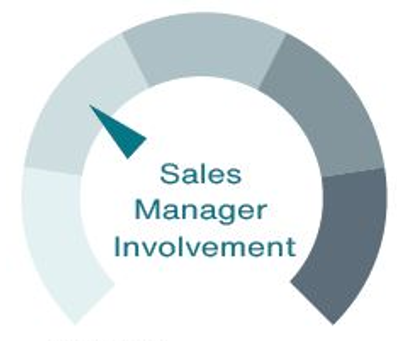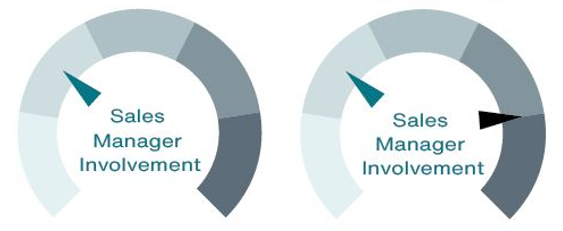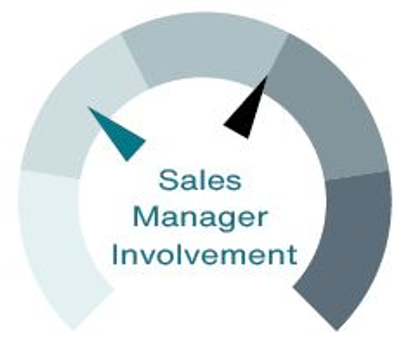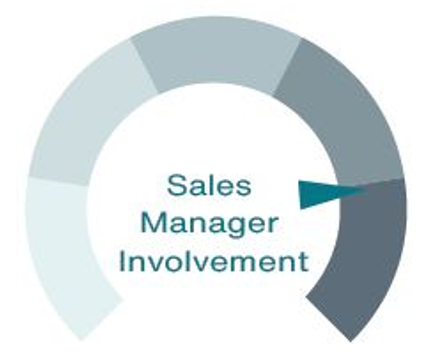Critical sales strategy decisions should be supported by the best information, and sales manager insight can lead to more successful strategies, better sales performance and improved manager and team productivity.
High inflation, supply chain disorder and elevated employee turnover, among other challenges, make it hard for companies to set revenue and other financial goals because of short and long term unexpected degrees of volatility and impact. For many companies, revenue is largely dependent on sales, and many find it equally difficult to set sales strategies and goals due to not only widespread economic disruptions, but also changing customer buying behaviors, declining in-person sales and customer interactions and growing digital and virtual service needs.
In light of these challenges, organizations should reassess their go-to-market strategy and other major sales drivers given their significant impact on an organizations’ business decisions, revenue growth and sales forces. When evaluating key sales drivers, the engagement and insight from sales managers is critical for the success of related strategy decisions.
Employers notoriously have a hard time ensuring front line sales managers execute sale strategies effectively which makes the role exceptionally valuable and difficult to fulfill. With this in mind, we know from observation that a sales strategy decision approach informed by sales managers leads to more thoughtful strategies and better execution. The most successful sales teams involve front line managers when making important sales strategy decisions.
As companies work to define their financial and revenue goals for 2022 and beyond, sales managers offer unparalleled insight on the four major sales topics listed below which can help business leaders craft successful sales strategies and enhance sales performance that bolster their financial and revenue goals.
1. Go-to-Market Strategy


Sales managers have valuable buyer and competition insights that can enhance market research analyses which is critical to understanding customer preferences and opportunities in the marketplace. This unique understanding can help shape better-informed decisions around sales channels, customer segmentation, coverage models and sales roles.
For example, a service delivery company we partnered with redesigned its sales coverage model for medium-sized accounts but kept the model for large accounts intact given its success with customers covered by multiple service line specialists with no individual responsible for managing the whole customer relationship. However, insights from sales managers revealed that while the company would win or lose one particular service offering in the past, they now risk losing customers across all service lines with the arrival of a new competitor that bundles all service lines together. Following this revelation, the leadership team revised the coverage model for larger accounts to include for each large account a dedicated solution specialist who engages with service line specialists.
While sales managers can be valuable informants when it comes to defining a go-to-market strategy, we recommend the involvement of a limited number of sales managers in the decision-making process. These individuals should be able to not only act as valuable informants of customer concerns and who are helpful to decision making, but also who are trusted to maintain confidentiality of all decisions and processes.
2. Sales Territories and Quotas (STQ)
STQ Design STQ Refinement


Companies should establish guiding principles for designing sales territories and quotas based on their go-to-market strategy and business objectives. The focus for most companies should be to develop a methodology and approach to STQ design that can be consistently and systematically applied every performance cycle. These principles should be used to design territories and allocate quotas as well as to maintain and refine processes which keep territories and quota setting current.
The cautious involvement of sales managers when it comes to setting up processes to develop, maintain and refine territories and quotas is beneficial to an organization for two reasons. First is that the established processes are more robust at accounting for the managers’ experience of dealing with the on-the-ground impact of processes and knowledge of the potential concerns from the field.
The second benefit is that managers are better able to understand the intricacies and rationale behind these processes which in turn improves their capability to address questions or concerns from the field. This ultimately leads to more thoughtful approaches to sales strategy and improved territory and quota setting and execution.
When it comes to the implementation of designed territories and quotas, sales managers have the unique ability to provide qualitative inputs that are typically not captured in quantitative data which can be used to refine the algorithmically set territories and quotas. Qualitative inputs could include information on recent or expected changes such as mergers and acquisitions, competitor contract changes, sales representative capabilities, specific customer situations and expected changes in legislation. This results in more realistic and acceptable territories and quotas.
The involvement of sales managers—first line or other line sales managers—when implementing territories and quotas generates strong internal support and buy-in from the field which is why we recommend a limited involvement of sales managers in the STQ design approach and an equal degree of sales managers in STQ refinement alongside an increased involvement of front line sales managers for major accounts. Certain strategic or major accounts with thorough account planning processes might warrant greater involvement from the sales representative and sales manager supporting the account.
3. Sales Compensation


Sales managers and other customer-facing roles can be valuable informants to incentive compensation design decisions. They can represent perspectives from the sales individuals (plan participants), discuss fundamental issues and offer competitive viewpoints. Their involvement can help drive field buy in, but senior leaders will need to be the final decision makers in not only designing sales incentive compensation programs, but also ensuring balance between compensation levels and company strategy.
Sales managers generally are not involved in making decisions around sales incentive compensation design, but there may be some exceptions especially for sales roles that are responsible for unique channels or important accounts that commonly have objectives-based performance measures.
IIt is extremely important for sales managers to understand and be able to articulate the sales compensation program to others regarding the overall sales strategy so that they can recruit the best sales talent and support team members by helping them to understand the activities they need to do in order to maximize earnings.
4. Talent Management


Of the four sales strategy topics we cover in this article, talent management is the area where sales managers should have the most control and be leaned on when making important strategy decisions regarding talent management.
There should be limitations to what sales managers can do with regard to talent management to ensure that consistent practices are applied across the business and that legal risks are minimized. For example, a manager may only be able to hire college graduates who have passed a background check. A sales manager may also be required to place a sales representative on a performance improvement plan before deciding to let a team member go.
Sales managers also have considerable control and influence when it comes to training talent. Informal and on-the-job training is very common in addition to formal mandated training that sales managers are trained on. Managers may oversee all aspects of training and supplement mandated training.
Next Steps
Sales managers, whose role is that of a lynchpin between top business executives and front line sales professionals, can be valuable informants in decision making given their experiences and deep understanding of sales and close work with customers. However, many companies tend to overlook their importance and unique insight because usually their peers in other non-sales functions are not involved in strategic decisions.
Companies that ensure the inclusion and buy in of sales managers regarding strategic sales decisions will benefit from more comprehensive and practical strategic solutions. The buy in of sales managers helps generate buy in from others as well including front-line sellers. These factors are critical for the successful execution and implementation of sales strategies.
Business leaders may find themselves not knowing how to optimize sales manager involvement and when and where to lean on their expertise and insight. We recommend for any company that wants to optimize sales manager involvement to start with a review of internal best practices which may vary for different types of sales managers or different parts of the business. After this, determine if changes such as a greater or lesser involvement of sales managers in important strategy discussions would be of value to the organization.
For more information on sales force optimization and effectiveness and how it impacts go-to-market strategies and sales compensation, please reach out to a member of our sales force effectiveness practice or write to humancapital@aon.com.